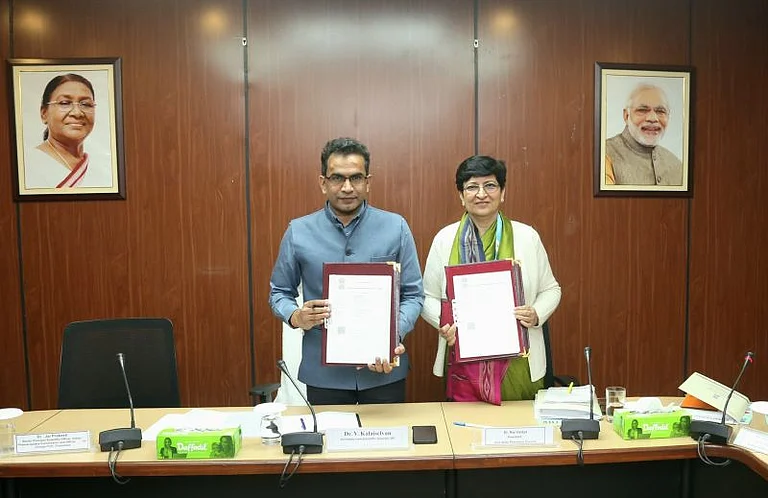A few days after V.P. Singh became prime minister in December 1989, he called BSP leader Kanshi Ram for ameeting. Singh opened his briefcase, waved a bunch of papers and declared it was nothing but the BSP manifesto—something he genuinely believed in. "Am I to blame for my birth in a particular caste?" Singh asked a sceptical Kanshi, adding that he sincerely wanted to have the BSP manifesto translated into reality.
Having contested and lost elections against Singh, Kanshi has so far steered clear of any truck with Singh or his Janata Dal. Yet, Singh was perhaps the first major politician to recognise his potential in socio-political transformation. Mainstream politics had till then dismissed Kanshi, during the course of his consistent battle, as "maverick and unreliable".
In August '90, Singh pulled out the Mandal Commission's report, which was gathering dust for almost a decade, and made it his mascot. But Kanshi wasn't impressed. Instead, he chose as his ally Mulayam Singh Yadav, who had burnt bridges with V.P. Singh a year before, and made his maiden entry to the Lok Sabha in November '91. Theirties deepened in '93 as Mulayam's Samajwadi Party and the BSP formed a coalition government in Uttar Pradesh—only to fall out acrimoniously 18 months later. Mulayam has remained a political pariah and life-time foe ever since.
Kanshi claims to be the natural leader of 85 per cent of India's population. For him, short-term alliances are just a legitimate way to realise this dream. This came as a blow to an emerging combination of the forces of 'social justice'. The brief alliance, however, gave the BSP its first big mandate—69 seats in the UP assembly with 11 per cent popular votes, against the 12 seats it won in '91 and 14 in'89. Kanshi Ram was, at last, a serious player in Indian politics. The ensuing four-month stint in power with BJP support, where Mayavati became the first Dalit woman chief minister, was not an error as far as Kanshi was concerned.
After all, Kanshi Ram has been eying a much larger constituency, one as 'nationally-distributed' as the BJP claims topossess. While the BJP considers the entire Hindu population its constituency, he claims to be the natural leader of 85 per cent of India's population: everyone, barring the 15 per cent upper caste Hindus. To prove this, he has steadfastly refused to seek refuge in reserved seats during all elections—whatever the verdict. AndMulayam, for him, is the leader of only one caste, representing less than 12 per cent of his concept of Bahujan Samaj.
After he quit a government job in the Explosives Research and Development Laboratory, Kanshi spent nearly 20 years experimenting with his thoughts in India's political laboratory. Despite initial success, he has a long way to go. But as the recent Lok Sabha results indicate, the BSP has emerged as a force to reckon with, securing 20.3 per cent votes nation widewith 11 seats—most of them from UP. Suddenly, the critic of 'Manuvadi politics' is desirable across the spectrum. Right from the BJP to the Congress and the Janata Dal, everyone is vying for his support.
For the BSP, a tie up with any party is a short-term tactical line: it adds to its political acceptability. A long-term alliance, on the contrary, would mean a compromise on its avowed objectives. The DS-4, a non-political front in operation since '81, was converted into a full-fledged political party to struggle for equality and against untouchability. And Kanshi knows other parties, including his allies, won't stretch themselves beyond a point on these issues.
On his part, Kanshi has established his moral authority by promoting second-rung leaders like Mayavati during his active career. The slogans, too, have become gentler and realistic: 'Baba tera mission adhura, Kanshi Ram karenge pura' (Kanshi will fulfil Ambedkar's mission) and 'Jiski jitni sankhya bhari, uski utni hissedari' (empowerment as per population) are the two war-cries now. The more militant 'Tilak, taraju aur talwar, inko maro jute char' (Brahmins, traders and Kshatr-iyas deserve kicks) is out.
It's too early to conclude that Kanshi's dream is close to reality; his following comes essentially from the elite among the Backwards. He has come a long way since '78 when he formed the BAMSEF (Backward and Minorities State Employees Federation) as a first step in his long plan. But, though the BSP is growing with each successive election, his movement hasn't struck deeper roots. His acceptability among mainstream parties hasn't necessarily taken him closer to his social target—the 65 per cent of the Bahujan Samaj that is yet untapped.


























